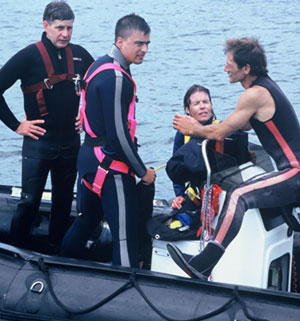Rescue Diver Course: Recognition Before the Dive
 Scuba diving is intended to be a fun activity that allows you to experience the underwater world as its residents do, living among the sea critters, large and small. The equipment that divers use allows for the adaptation of the ocean realm to our body. If breathing out of a hose and having to wear a mask to see clearly feels weird; it is because it is weird. Our bodies are not designed to breathe and see underwater and therefore, we have to adapt not only physically, but mentally as well.
Scuba diving is intended to be a fun activity that allows you to experience the underwater world as its residents do, living among the sea critters, large and small. The equipment that divers use allows for the adaptation of the ocean realm to our body. If breathing out of a hose and having to wear a mask to see clearly feels weird; it is because it is weird. Our bodies are not designed to breathe and see underwater and therefore, we have to adapt not only physically, but mentally as well.
It is important to recognize how you feel before a dive, because this will certainly be a factor in the level of enjoyment that you may experience during your dive. It is perfectly normal to feel some nerves or to experience stress before getting into the water. After all, assembling your equipment and getting kitted up is noted as being one of the most stressful time periods, as the diver is about to embark on an adventure into another world.
Having the jitters before a dive may also be a result of a degree of confidence. If you are a newly-certified diver about to have your 10th dive after certification, a case of the jitters is quite normal and frankly, if you weren’t, it wouldn’t be normal. Is this dive going to be difficult? Am I prepared for this type of dive? Am I properly trained? Do I have the appropriate equipment for this dive? These are all appropriate thoughts to be having and show that your mind is where it needs to be.
As you gain experience you’ll notice an increase in confidence in your skills, an increase in your ability to recognize right and wrong while still maintaining a normal level of nervousness. What you don’t want is to become so comfortable that complacency overrides your nervousness. Anxiety is perfectly normal, and can even be healthy as an indicator of your mental state of mind. It is usually created by a mix of excitement…and who would not be excited prior to a dive?
It is important to be able to recognize panic or stress before a dive. Going into a dive with the wrong frame of mind can lead to a dangerous experience. It is always better to abort a dive and regroup, than to jump into a dive that may lead to a panic situation. There are many reasons for levels of anxiety to reach dangerous levels including, poor gas management, lack of knowledge of the dive site, adverse weather conditions such as cold climates, surge, and rough water surface.
A large part of the diving instructor’s role, in fact, is in creating a comfort level that induces eagerness rather than anxiety and confidence rather than bravado in the student. Still, many novice divers will enter the water with the thought that they will always be waging a life-or-death battle with hypothermia, malicious currents and insatiable predators. Stress is a predictable consequence of this train of thought.
Recognizing the signs of stress
|
|
SDI’s Rescue Diver course will help you understand prevention of some of the leading causes of accidents relating stress and psychological factors including the panic syndrome in self. It is important for divers to understand how to read signs in their own behavior, as well as that of their fellow divers. Learn more about physical conditioning, equipment management, diver assists, surface and underwater rescues and diver first aid. The SDI Rescue Diver class is not only designed to offer you knowledge in how to prevent unfortunate diving incidents from occurring, but how to properly deal with them in the event that they do occur. You will find that divers will be much more comfortable after having the SDI Rescue certification and it is a fun class to take with your dive buddy, before heading off for a trip, be it a spouse, parent or offspring or your diving friends.
For more information on this topic, sign up for SDI’s Rescue Diver Course today at your local SDI Dealer.
Contact SDI TDI and ERDI
If you would like more information, please contact:
SDI
Tel: 888.778.9073 | 207.729.4201
Email: Worldhq@tdisdi.com
Facebook: www.facebook.com/ SDITDI


Hagyj válaszolni
Szeretne csatlakozni a vitához?Nyugodtan járulj hozzá!